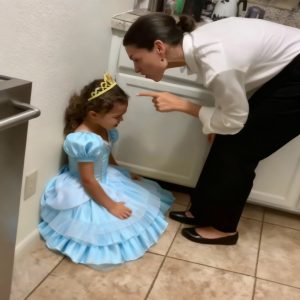MY MOTHER FORBIDDEN ME TO VISIT HER FOR 3 MONTHS – WHEN I FINALLY DECIDED TO GO SEE HER, I TURNED PALE,
My mother told me not to visit her for 3 months for “renovations”.
Weird, but I didn’t pay much attention to it at first. But then her calls got shorter and she seemed distant, so I decided to go see her without calling.
When I arrived, the house looked normal from the outside, except for the garden, which was full of weeds, which was rare in it.
Walked in, expecting a disaster, but there was nothing. No reforms, no dust, just emptiness. I ran up and, when I saw her, my heart stopped because
…she was sitting in the living room, fully dressed, with makeup on, her hair perfectly styled—just staring at the blank TV screen. Not moving. Not blinking.
“Mom?” I whispered, stepping closer.
She didn’t react.
My voice trembled. “Mom, it’s me.”
Slowly, her eyes shifted to meet mine. Her smile was small, brittle—like something she had practiced.
“Oh… you came.”
Her voice was dry, distant. I moved toward her and hugged her, but she didn’t lift her arms to return it. That’s when I noticed it: the house was cold. Unusually cold. And eerily silent—no hum from the fridge, no ticking from the clock she always kept above the fireplace.
“What’s going on? You said you were renovating, but—” I stopped. “Why didn’t you want me to come?”
She blinked slowly, and then, almost in a whisper, said, “I didn’t want you to see me like this.”
I pulled back and knelt in front of her. “Like what?”
She didn’t answer right away. Her hands trembled slightly in her lap.
Then she said it.
“I was diagnosed with early-onset dementia… three months ago.”
My breath caught.
“I didn’t know how to tell you. At first, I thought maybe it wasn’t true. Then… I started forgetting things. Your birthday. How to make tea. One day I got lost in my own house.”
Tears slid down her cheeks, untouched.
“So I told you I was renovating. I thought I’d have time to get better. Or to learn how to hide it. But I only got worse.”
I didn’t speak. I just took her hands in mine.
“That’s why the garden’s dying,” she whispered. “I forgot to water it. I forgot I even had one.”
We sat there in silence. My mother, who had always been sharp and warm and full of life, now looked like a fragile version of herself—fading, but still fighting.
“I didn’t want you to see me like this,” she repeated. “But now I’m scared. Because I’m starting to forget you.”
That broke me.
“I’m here now,” I said through tears. “And I’m not leaving. We’ll face this together. Every day. Even the ones you forget—I’ll remember for you.”
Her eyes filled with something I hadn’t seen in weeks: relief.
And in that quiet house, filled with silence and sorrow, we began something new—not just caring for her, but learning how to love each other in the spaces where memory fails but the heart still knows.




